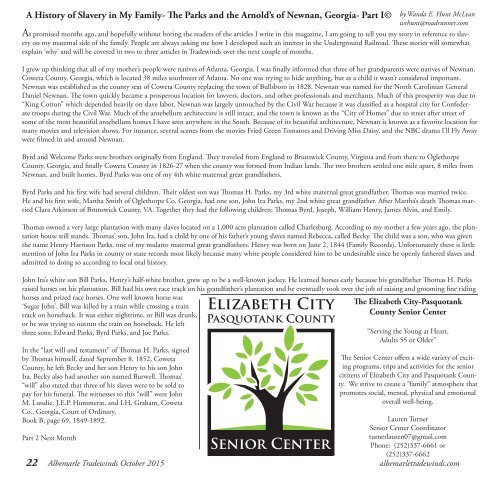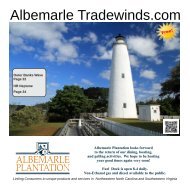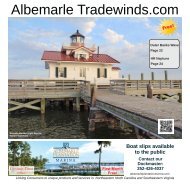Web Final Oct 2015
October 2015
October 2015
You also want an ePaper? Increase the reach of your titles
YUMPU automatically turns print PDFs into web optimized ePapers that Google loves.
A History of Slavery in My Family- The Parks and the Arnold’s of Newnan, Georgia- Part I©<br />
by Wanda E. Hunt McLean<br />
wehunt@roadrunner.com<br />
As promised months ago, and hopefully without boring the readers of the articles I write in this magazine, I am going to tell you my story in reference to slavery<br />
on my maternal side of the family. People are always asking me how I developed such an interest in the Underground Railroad. These stories will somewhat<br />
explain ‘why’ and will be covered in two to three articles in Tradewinds over the next couple of months.<br />
I grew up thinking that all of my mother’s people were natives of Atlanta, Georgia. I was finally informed that three of her grandparents were natives of Newnan,<br />
Coweta County, Georgia, which is located 38 miles southwest of Atlanta. No one was trying to hide anything, but as a child it wasn’t considered important.<br />
Newnan was established as the county seat of Coweta County replacing the town of Bullsboro in 1828. Newnan was named for the North Carolinian General<br />
Daniel Newnan. The town quickly became a prosperous location for lawyers, doctors, and other professionals and merchants. Much of this prosperity was due to<br />
“King Cotton” which depended heavily on slave labor. Newnan was largely untouched by the Civil War because it was classified as a hospital city for Confederate<br />
troops during the Civil War. Much of the antebellum architecture is still intact, and the town is known as the “City of Homes” due to street after street of<br />
some of the most beautiful antebellum homes I have seen anywhere in the South. Because of its beautiful architecture, Newnan is known as a favorite location for<br />
many movies and television shows. For instance, several scenes from the movies Fried Green Tomatoes and Driving Miss Daisy, and the NBC drama I’ll Fly Away<br />
were filmed in and around Newnan.<br />
Byrd and Welcome Parks were brothers originally from England. They traveled from England to Brunswick County, Virginia and from there to Oglethorpe<br />
County, Georgia, and finally Coweta County in 1826-27 when the county was formed from Indian lands. The two brothers settled one mile apart, 8 miles from<br />
Newnan, and built homes. Byrd Parks was one of my 4th white maternal great grandfathers.<br />
Byrd Parks and his first wife had several children. Their oldest son was Thomas H. Parks, my 3rd white maternal great grandfather. Thomas was married twice.<br />
He and his first wife, Martha Smith of Oglethorpe Co. Georgia, had one son, John Ira Parks, my 2nd white great grandfather. After Martha’s death Thomas married<br />
Clara Atkinson of Brunswick County, VA. Together they had the following children; Thomas Byrd, Joseph, William Henry, James Alvin, and Emily.<br />
Thomas owned a very large plantation with many slaves located on a 1,000 acre plantation called Charlesburg. According to my mother a few years ago, the plantation<br />
house still stands. Thomas’ son, John Ira, had a child by one of his father’s young slaves named Rebecca, called Becky. The child was a son, who was given<br />
the name Henry Harrison Parks, one of my mulatto maternal great grandfathers. Henry was born on June 2, 1844 (Family Records). Unfortunately there is little<br />
mention of John Ira Parks in county or state records most likely because many white people considered him to be undesirable since he openly fathered slaves and<br />
admitted to doing so according to local oral history.<br />
John Ira’s white son Bill Parks, Henry’s half-white brother, grew up to be a well-known jockey. He learned horses early because his grandfather Thomas H. Parks<br />
raised horses on his plantation. Bill had his own race track on his grandfather’s plantation and he eventually took over the job of raising and grooming fine riding<br />
horses and prized race horses. One well known horse was<br />
‘Sugar John’. Bill was killed by a train while crossing a train<br />
track on horseback. It was either nighttime, or Bill was drunk,<br />
or he was trying to outrun the train on horseback. He left<br />
three sons; Edward Parks, Byrd Parks, and Joe Parks.<br />
In the “last will and testament” of Thomas H. Parks, signed<br />
by Thomas himself, dated September 8, 1852, Coweta<br />
County, he left Becky and her son Henry to his son John<br />
Ira. Becky also had another son named Burwell. Thomas’<br />
“will” also stated that three of his slaves were to be sold to<br />
pay for his funeral. The witnesses to this “will” were John<br />
M. Lundie, J.E.P. Hummerat, and I.H. Graham, Coweta<br />
Co., Georgia, Court of Ordinary,<br />
Book B, page 69, 1849-1892.<br />
Elizabeth City<br />
Pasquotank County<br />
The Elizabeth City-Pasquotank<br />
County Senior Center<br />
“Serving the Young at Heart,<br />
Adults 55 or Older”<br />
The Senior Center offers a wide variety of exciting<br />
programs, trips and activities for the senior<br />
citizens of Elizabeth City and Pasquotank County.<br />
We strive to create a “family” atmosphere that<br />
promotes social, mental, physical and emotional<br />
overall well-being.<br />
Lauren Turner<br />
Senior Center Coordinator<br />
Part 2 Next Month<br />
turnerlauren07@gmail.com<br />
Senior Center<br />
Phone: (252)337-6661 or<br />
(252)337-6662<br />
22 Albemarle Tradewinds <strong>Oct</strong>ober <strong>2015</strong> albemarletradewinds.com

















